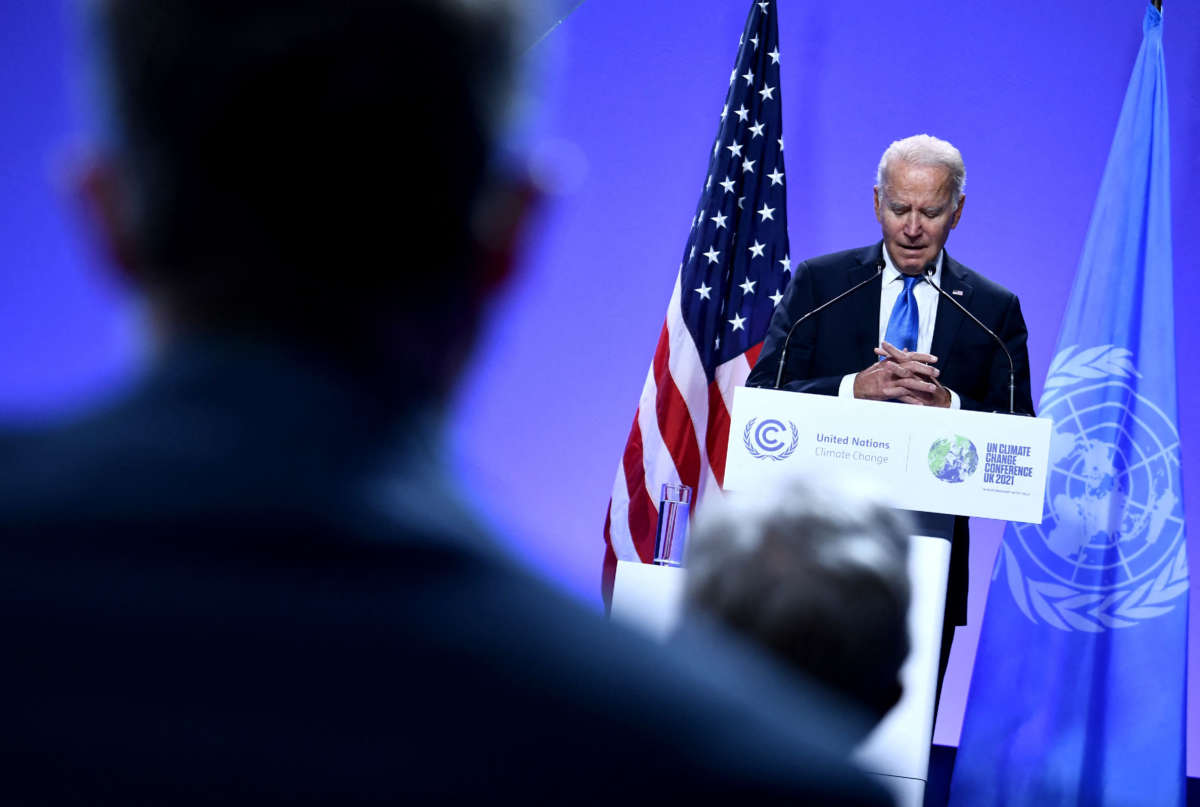There is a scene from Francis Ford Coppola’s bleak masterpiece Apocalypse Now that came to mind in the aftermath of the Glasgow climate conference and Wednesday’s big oil lease shindig for drilling rights in the Gulf of Mexico.
Captain Willard, played by an impossibly young Martin Sheen, has dragged a boat crew deep into the Vietnam jungle in search of his target, Col. Walter Kurtz. The boat arrives at the Do Lung Bridge, the scene of what appears to be a permanent battle, and the night is split with explosions, rifle fire and the screams of the dying. Willard goes in search of the commanding officer, only to find a handful of U.S. soldiers cowering behind an earthen wall. “Hey soldier,” he asks one hollow-eyed troop, “do you know who’s in command here?” The soldier stares at him a moment and replies, “Yeah,” before turning back to the darkness.
The implication is clear: You’re not in charge, captain. Neither am I, or any of these others here. Those voices out there in the gloom beyond the perimeter, the ones moving unseen in great force? They’re the ones running this nightmare.
In Glasgow, representatives from 200 countries came together to give speeches and praise each other for taking action, but in the end, they could not bring themselves to say, “Coal is bad.” Clearly, someone else was in charge.
“Case in point,” reports The Los Angeles Times. “The Glasgow pact for the first time in more than 25 years of negotiations makes explicit reference to the fossil fuels that are causing climate change. But it calls only for a ‘phasedown of unabated coal’ — language that was supposed to read ‘phase-out’ until it was weakened at the last minute by India. It calls for a ‘phase-out’ of ‘inefficient’ fossil-fuel subsidies, but includes no commitment to ending oil and gas production.”
Tens of thousands of protesters, many of them young people, roared their displeasure at the scant progress made in Glasgow. “Now is the time,” said Dominique Palmer, a 22-year-old activist. “Yesterday was the time. We need action right now.” Eric Njuguna, a 19-year-old activist from Kenya, echoed Palmer’s sentiments. “Cognitive dissonance,” he said. “We were expecting serious commitments at COP26 on climate finance and climate mitigation. The commitments aren’t strong enough.”
If it is cognitive dissonance you seek, Mr. Njuguna, look no further than the sun-bleached, oil-poisoned waters in the Gulf of Mexico. President Biden and his Glasgow coterie had not been back long enough to adjust to the time zone changes when his administration presided over a massive lease sale for oil drilling rights in the Gulf.
Biden ran hard on salvaging the environment, and his administration says it tried to stop this sale, but there it went anyway: Lease Sale 257 generated $191,688,984 in high bids for 308 tracts covering 1.7 million acres in federal waters of the Gulf of Mexico, according to the Bureau of Ocean Energy Management (BOEM). “ExxonMobil Corporation submitted the highest number of total bids at 94 and Chevron U.S.A. Inc submitted the largest value of total high bids at $47,128,011, lease sale 257’s final notice of sale information package shows,” reports Rigzone. “Other companies participating in the sale included Shell Offshore Inc, BP Exploration & Production Inc and Equinor Gulf of Mexico LLC.”
Yep, there’s BP back in its old stomping grounds, where you can still see how the 130 million barrels of crude oil it dumped into the waters 11 years ago continue to do deep damage to wildlife and the overall environment. Now BP and its pals are going to build a whole new slew of rigs right on top of the boneyard they created a decade ago.
… and even that really isn’t even the worst part. The worst part is that it will take years to bring this new oil-pumping infrastructure online, which means these things will just be getting started on extraction when we roll through the year 2030, a date many climate scientists see as a point of no return regarding carbon emissions and the warming of the planet. In effect, the oil industry just paid top dollar to the U.S. government for the privilege of building profitable suicide machines in the dying waters of the Gulf.
The infrastructure bill contains billions in fossil fuel subsidies, even as it was stripped of all meaningful climate policy. The Build Back Better Act, a lifeboat for those stripped-out climate policies, now hangs by a thread, its fate largely controlled by a coal baron from West Virginia. The Glasgow climate conference probably harmed the environment with all the jet fuel burned to get there and back, but it accomplished little else. Now, leases for more oil drilling are flying to anyone who can write the government a big enough check.
Do you know who’s in command here?
Yeah.
Join us in defending the truth before it’s too late
The future of independent journalism is uncertain, and the consequences of losing it are too grave to ignore. To ensure Truthout remains safe, strong, and free, we need to raise $43,000 in the next 6 days. Every dollar raised goes directly toward the costs of producing news you can trust.
Please give what you can — because by supporting us with a tax-deductible donation, you’re not just preserving a source of news, you’re helping to safeguard what’s left of our democracy.
